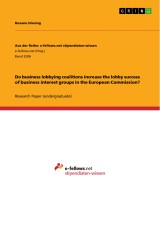Details

Do business lobbying coalitions increase the lobby success of business interest groups in the European Commission?
1. Auflage
|
13,99 € |
|
| Verlag: | Grin Verlag |
| Format: | |
| Veröffentl.: | 22.07.2019 |
| ISBN/EAN: | 9783668985032 |
| Sprache: | englisch |
| Anzahl Seiten: | 16 |
Dieses eBook erhalten Sie ohne Kopierschutz.
Beschreibungen
Research Paper (undergraduate) from the year 2018 in the subject Politics - International Politics - Topic: European Union, grade: 1,3, University of Constance, language: English, abstract: With my study I want to contribute to the current debate on the influence of so-called lobby coalitions on policy outcomes with a focus on the way the lobbying process in the European Commission is organized. Since this is a rather new field that still lacks empirical research, I will analyse the influence of lobby coalitions in European policymaking with the help of a representative case. I will focus on business lobby coalitions especially.
In the end of November 2017, the German Minister of Agriculture voted surprisingly for a further use of the herbicide Glyphosate in the Council of the European Union. However, Minister Schmidt did neither concur with his national coalition partner SPD nor with the World Health Organisation, which declared that Glyphosate could foster cancer. Did Schmidt give the agriculture lobby a voice with his vote? Companies like Monsanto, being part of the German Giant Bayer and the agriculture lobby, would have lost its main field of business with a decision against the herbicide. The controversial case of Glyphosate revives the old debate on the role of business interest lobbyism in the EU. Frequently, the process of policy making is under critic by the public for its lack of transparency in regard to the influence of powerful business lobbies. Particular the European Commission (EC), which on one hand has an exceptional role in the European legislation and on the other hand relies on input legitimacy for their policy-making, which is mainly provided by experts (interest groups) and on their expert information.
In the end of November 2017, the German Minister of Agriculture voted surprisingly for a further use of the herbicide Glyphosate in the Council of the European Union. However, Minister Schmidt did neither concur with his national coalition partner SPD nor with the World Health Organisation, which declared that Glyphosate could foster cancer. Did Schmidt give the agriculture lobby a voice with his vote? Companies like Monsanto, being part of the German Giant Bayer and the agriculture lobby, would have lost its main field of business with a decision against the herbicide. The controversial case of Glyphosate revives the old debate on the role of business interest lobbyism in the EU. Frequently, the process of policy making is under critic by the public for its lack of transparency in regard to the influence of powerful business lobbies. Particular the European Commission (EC), which on one hand has an exceptional role in the European legislation and on the other hand relies on input legitimacy for their policy-making, which is mainly provided by experts (interest groups) and on their expert information.
Diese Produkte könnten Sie auch interessieren:

Inclusión educativa de niños, niñas y adolescentes migrantes venezolanos, en Colombia

von: Douglas Jiménez

15,99 €
















